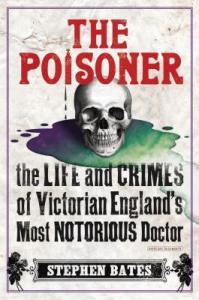 Non-Fiction
Non-Fiction3*s

Well every year I like to explore my weird obsession with poisoners a little bit more and Dr William Palmer who was tried for the murder of his friend in 1856 by poisoning seemed a good place to travel to in this journey.
Stephen Bates has compiled his book based on the 12 day trial for poisoning his gambling partner by strychnine, one of the less common poisons to use. On 13 November 1855 Palmer’s friend John Parsons Cook was on a high, he’d managed to win, when he was lucky enough to win £3,000 at Shrewsbury races, Palmer’s horse didn’t win. That night the winner fell ill and the loser tended to him. Dr William Palmer had trained as a surgeon and at best was a small town GP but he’d given up that as a way to make money long ago and now he gambled and part-owned horses to make his living.
In order to set out the facts for us I have to commend the author for the amount of research into this case using amongst other items the newspapers of the day and the archives at both Kew and Stafford, the area in which the death of John Parsons Cook occurred. What follows was even for the day, a large number of deaths including his brother and a number of children, killed for the insurance money the prosecution ascertained. But why did Palmer kill his partner? What was the motive? Well according to the victim’s father it all hinged on his betting book, Cook hadn’t yet collected his winnings before falling ill but if that was the case, Palmer’s scheme failed because he wasn’t able to get his hands on them either.
Sadly the book itself was not written in the most sparkling of prose, it often got bogged down in the particulars losing sight somewhat of the overall story. Yes, it is non-fiction, but a good author, and editor, will keep the narrative moving along. Sadly there was repetition from the early chapters in the later ones, maybe the author was worried we’d lost track by then! The book starts well enough with a description of the day of the race, the subsequent illness and the calling of the doctor for assistance but later on we skip back to the other ‘mysterious deaths’ and a (very) long chapter on the racing world only to pick over the details of the crime again when it came to court. Perhaps a judicial editor could have made the entirety feel slightly less ‘stodgy’
That said, there was an awful lot to enjoy and many parts that I found fascinating, particularly the social history that backs up this particular crime. As always the newspaper coverage was interesting as was their horror at the number of people that turned up at the courts etc… you can always rely on the media to be the most hypocritical bunch. That might also be said about our dear friend Charles Dickens who pops up with regularity in all these Victorian trials, and hangings, bemoaning the popularity of events. It is rumoured that Inspector Bucket from Bleak House was modelled on the tenacious Charles Frederick Field who investigated the insurance angle of the crime.
Facts such as that this was the first trial moved from its home county following the Central Criminal Court Act 1856 being passed by an Act of Parliament due to the belief that the accused couldn’t possibly get a fair trial in Staffordshire; the trial was held at the Old Bailey instead, were stacked high and so on balance it was worth a read for an ardent follower of poisoners through the ages such as myself.
The Poisoner is my twelfth read in my 20 Books for Summer 2018 Challenge
First Published UK: 2014
Publisher: Gerald Duckworth & Co Ltd
No of Pages: 324
Genre: Non-Fiction
Amazon UK
Amazon US

